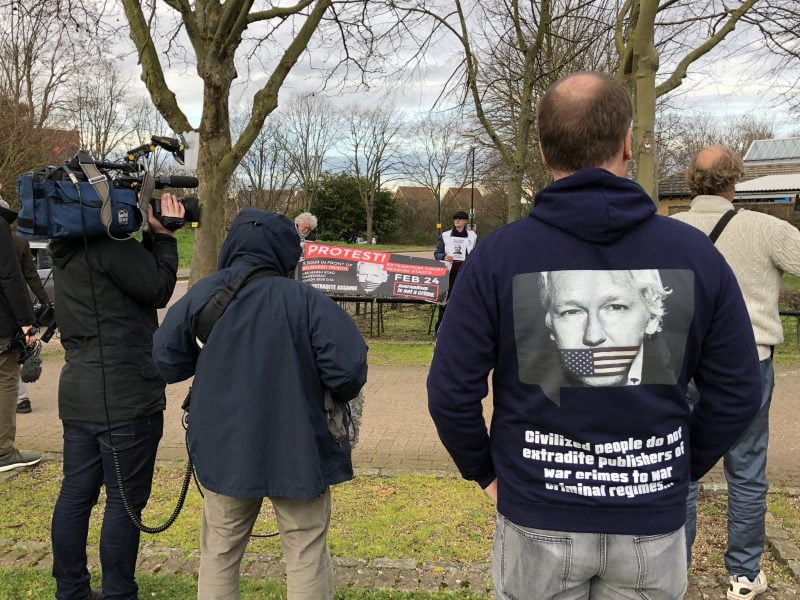The international pressure by NGOs on the British government not to extradite Wikileaks’ founder Julian Assange to the US has been stepped up with the start of his court hearing in the UK today.
OSCE Representative on Freedom of the Media, Harlem Désir, expressed his concern at the numerous charges faced by Assange and his “disproportionate” prison sentence – he faces up to 175 years if convicted.
“The public interest of several of the publications by WikiLeaks in 2010 should be taken into account, as it contributed to important investigative reports and news reporting. It is essential to consider the impact on freedom of expression and media freedom if he is extradited and convicted. This could have a chilling effect on journalism and press freedom,” Désir said.
I call on the #UK authorities not to extradite @wikileaks editor #JulianAssange to the #US, at Monday's hearing. The numerous charges and disproportionate sentence he faces could have a chilling effect on freedom of expression and press freedom. See full statement here:
— OSCE media freedom (@OSCE_RFoM) February 23, 2020
Reporters Without Borders (RSF) also turned up in full force in London with representatives from its Paris headquarters, as well as the directors of the UK and Germany bureaus calling for his release.
RSF Secretary-General Christophe Deloire said in a comment outside the courts that his extradition to the US would pose a major danger to journalism.
Assange, who has been kept in a high security prison in Belmarsh, started his extradition hearing on Monday and could potentially be taken to the US to be charged with violating the Espionage Act for publishing classified information showing the US Government had misled the public about activities in Afghanistan and Iraq and committed war crimes.
« Si Julian Assange devait être extradé vers les États -Unis, ça ferait peser un danger majeur pour le journalisme. » déclare Christophe Deloire. pic.twitter.com/PNHtWlGLCx
— RSF (@RSF_inter) February 23, 2020
This message was also reiterated by the Committee for the Protection of Journalists, which said the extradition request would affect press freedom. Assange’s extradition for his groundbreaking work with WikiLeaks would deal a “body blow to First Amendment rights and press freedom. The UK should deny this request,” CPJ Deputy Executive Director Robert Mahoney said.
“Using the draconian wartime powers of the Espionage Act against Assange undermines journalists’ rights and sets dangerous precedents that cast journalists and publishers as criminals,” the US-based organisation added.
Hundreds of people took to the streets in London last week in a protest against his extradition. Pink Floyd’s Roger Waters, British fashion designer Vivienne Westwood and Wikileaks editor-in-chief Kristin Hrafnsson were among those who took part and addressed the crowd.
Around 44,000 have so far signed a petition asking for his release. Set up by RSF, the petition argues that the publication of the documents by media outlets was clearly in the public interest and not an act of espionage.
Catalan separatist leader and Spanish MEP Carles Puigdemont pointed out in a tweet that without “freedom of expression and freedom of the press there is no democracy”.
A series of global protests will be held today at different times against his extradition in cities like Auckland, Seoul, New York, Berlin, Mexico City and Washington DC.
Global Protests to mark the beginning of Julian Assange's Extradition Hearing – February 24 2020#DontExtraditeAssange #AssangeCase pic.twitter.com/NOqgaDGQPT
— WikiLeaks (@wikileaks) February 23, 2020
The news that his private conversations with his lawyers at the Ecuadorian embassy were secretly recorded and turned over the British authorities also raised concerns.
Concerns about his health had been raised by UN special rapporteur on torture Nils Melzer who said Assange had been deliberately exposed to inhuman and degrading treatment while imprisoned. Assange is also listed as the only journalist held under arbitrary detention in Europe in the Council of Europe’s press freedom alerts.
“The detention regime currently imposed on Assange appears to be unnecessary, disproportionate, and discriminatory and to perpetuate his exposure to psychological torture or other cruel, inhuman or degrading treatment or punishment,” Melzer said.
Earlier this month, more than 130 prominent German politicians, artists and journalists joined international organisations in their call to release the Wikileaks’ founder and signed a petition, saying that his detention was a “serious violation” of basic human rights.












